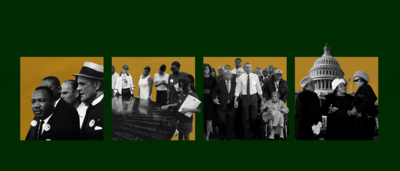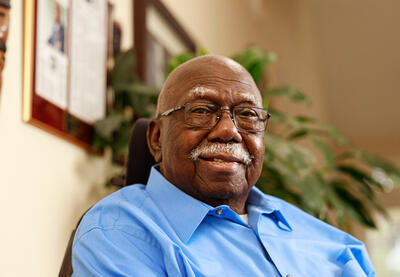Charles Person became active in the Civil Rights Movement as a freshman at Morehouse College and was the youngest of the original Freedom Riders of 1961. In this excerpt from his 2023 interview with Learning for Justice, Person reminds us that collective civic action is essential, and so is being one of the good people out there.
Involvement in the Civil Rights Movement
At Morehouse, the sit-ins were really in full swing. As the campaign increased and they needed more and more bodies, they finally allowed freshmen to participate. And that’s when I became involved.
I remember our first march. …
After that, we started the sit-ins. We started at places that we needed to, like where the draft was collected. …
Well, we didn’t know what a Freedom Ride was, but my opportunity to fight segregation at another level was intriguing. So, I applied, and for some reason they chose me.
On Being a Freedom Rider in 1961
I was 18 and I was the youngest Freedom Rider of the first group. …
Most people don’t realize the Freedom Riders, we paid full fare. We were not subsidized by anyone else. … Many families volunteered to keep us or protect us overnight. And it gave my mom some concern, but after the first night, and I told her, we met some of the finest people in the world, and they gave us the best that they had.
And in my diary, I had the names and phone numbers of people I had wanted to get in touch with after the rides and thank them for their hospitality and for the love that they showed us. Well, I lost that diary in Birmingham.
When I got back from Birmingham, I get to Atlanta, and I was subpoenaed by the Justice Department. … There’s a picture … of me being beaten. … Well, the FBI identified all these guys and arrested them. … Now the trial was in Montgomery because that’s the county seat for crimes in that area. … I get there, and I spend two weeks in the shenanigans of a trial because after all the testimony and all the evidence that was presented, they were exonerated.
But when I got home, I got back and the guys had been released, and my mom saw that I was depressed. And she knew I was going to stay in the movement no matter what. So she says to me, she says: “Tony, why don’t you join the Army? You’ll be safer in the Army than staying in the Civil Rights Movement.”
During the rides we had no anticipation that we were going to be successful, but we knew we had to do something. We wanted to appear as normal people riding. We just happened to be in the seat with a person of a different race. But that was what we were trying to show the other passengers. Because what happened on several buses when Black people saw that we were not sitting in the back, they sat in the front too, or they would go into the white waiting room.
But one of the most insidious things that happened to us is that when you went into a restaurant in the bus stations. Now they had a big kitchen, and they would serve Black folks through a cubbyhole, which is a little … square window where the same food is coming out of the same cafeteria, and it was just like you were shoving food to an animal. I mean, that was the most demeaning things.
Some of the things we were confronted with – it’s just amazing how we even dealt with them. And sometimes it brings nightmares. Sometimes it brings you to tears. But all in all, you knew that it was a worthwhile cause.
A Message of Encouragement for Today
If you have the wherewithal, donate to certain charities. The bulk of what I contribute – other than my tithes – is to Native American causes because I didn’t realize how bad it still is for many of them. But there are groups that really need your help. I mean, I’m still a member of the NAACP, but I think I had to expand my horizons, because as they get better, we all get better.
Buses Are a Comin’: Memoir of a Freedom Rider
In this recently published memoir, Charles Person and Richard Rooker provide an intimate look at Person’s thoughts, feelings, observations and motivations as the youngest of the original 13 Freedom Riders.
There’s good people out there, and if you get to know them, you’ll become one of those good people.
Yes, there are things [that] will make you angry, will make you very mad, but those are the truths of our history. But there’s nothing for not loving America. Most of us would not want to live anyplace else. And I lived in a lot of places in this world, and ain’t no place like home, as they say. Yeah, no place like home.
Reflection and Action
- Charles Person talks about his experiences during the Civil Rights Movement and offers some recommendations to us today. What about his words and experiences resonates with you?
- Reflect on issues that are important to you and your community. What changes would you like to see and why? What barriers and challenges exist? Look for organizations that work to address these challenges. Reach out or review their website for ways you can get involved.
- What actions can we take in our daily lives to become one of the “good people out there”?
Interviews by Crystal Keels, Ph.D. (she/her), LFJ’s analyst for learning content, and Jacob Saylor (he/him), SPLC’s senior video producer.

Learning from the Civil Rights Movement
The Civil Rights Movement is a story of people who believed they could bring about change. The learning journeys and resources in this series can help us learn from our history and examine today’s justice issues to answer the questions: “How can I make a difference?” “How can we make a difference together?”
